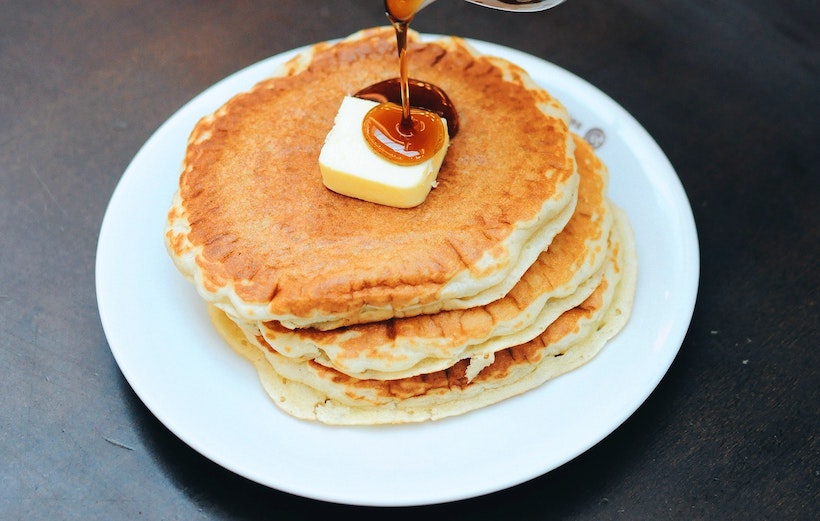In Christianity, the liturgical season of Lent represents the 40 days Jesus fasted in the desert and is a period of reflection and abstinence from excess. In the Northern Hemisphere, Lent also coincides with coming out of winter's long, dark days.
When faced with an extended period of reflection and moderation, as humans, it makes sense to indulge ourselves as much as possible before the restrictions commence. And that – in short – explains the history of Pancake Tuesday.
Although the Church meant for Shrove Tuesday – the day before Ash Wednesday and 47 days before Easter – to be a day of reflection, forgiveness, and absolution, it's also evolved into festivities such as pancake flipping, parade float viewing, and face-stuffing.

Pancake Tuesday is an informal name for Shrove Tuesday, the day before Ash Wednesday, which marks Lent's beginning. As the Church doesn't count Sundays in Lent, Shrove Tuesday is a movable holiday that always occurs 47 days before Easter.
In countries that celebrate, their festivities live up to the name – people make, flip, and eat pancakes to mark the date. Those countries combine that with various festivities, such as competitive pancake flipping, pancake tosses, pancake eating contests, and – as you'll see later – massive football games with few rules.
The day before Ash Wednesday, which kicks off the 40-day liturgical season of Lent, goes by quite a few names. The three days preceding Lent is known as Shrovetide, from the word shrive, which means to seek absolution or forgiveness.
Shrove Tuesday, therefore, is a day for seeking forgiveness before Lent begins. On Shrove Tuesday, churches ring the Shriving Bell calling believers to services to confess their sins.
In practice, Mardi Gras usually refers to the entire Carnival period, starting on January 6th (the Epiphany – when the Three Wise Men or Magi met Jesus) and culminating on Shrove Tuesday. However, lower-case mardi gras translates to Fat Tuesday – meaning Fat Tuesday, Shrove Tuesday, Mardi Gras, and Pancake Tuesday are all the same day. And if you're Irish? Máirt Inide, indeed, is another name for Shrove Tuesday.
Pancake Tuesday or Shrove Tuesday is a movable holiday – while it is always the day before Ash Wednesday, Easter's date is based on the lunar cycle.
Easter is the first Sunday after the Paschal full moon – the first full moon after the Vernal, or Spring, Equinox. Shrove Tuesday is always exactly 47 days before Easter.

While the early Christian Church has always enforced preparations before Lent, it was a while before the specific ingredients came together. Around 600 A.D., Pope St. Gregory barred all practicing Christians from consuming meat and animal products during the Lenten season. He wrote about abstaining from "things that come from flesh, as milk, cheese, and eggs." Hard to fit a pancake through those rules...
While it's impossible to chart a start date on Pancake Tuesday, you can see why it became popular. Eventually, Christians combined flour, milk, sugar, and eggs to make pancakes – effectively "using up" the ingredients before Lent began. And while many countries celebrate, Christians in the United Kingdom take it most seriously – the tradition likely started in roughly the 15th century on the British Isles.
In a post on Pancake Tuesday, there's nothing tastier than lore. While we'll never be able to confirm it, Olney in Buckinghamshire, south of London, England, claims it's where pancake races begin.
According to local lore, in 1445, the local church rang the shriving bell on Shrove Tuesday and a young housewife panicked and ran to church – with her frying pan (and the pancakes inside) still in her hand. To this day, every Pancake Tuesday, Olney throws its world-famous pancake race.
The rules? Suit up in your apron and bring your frying pan – this race ends at the church door. Oh, and be sure to flip the cake as you run.
You probably know about Mardi Gras – with it often comes parades, beads, coins, and king cake.
And countries that come down heavier on the pancake side have the aforementioned pancake races, along with pancake tossing contests – and the ubiquitous pancake eating contests.
However, one of the more enduring traditions is medieval football – a sport far beyond that Americans know as 'soccer'.
In the 12th century, author William FitzStephen described the annual Shrove Tuesday 'mob football' game thusly:
"After lunch, all the youth of the city go out into the fields to take part in a ball game. The students of each school have their own ball; the workers from each city craft are also carrying their balls. Older citizens, fathers, and wealthy citizens come on horseback to watch their juniors competing, and to relive their own youth vicariously: you can see their inner passions aroused as they watch the action and get caught up in the fun being had by the carefree adolescents."
In the British Isles, those mob football games continue today – and continue to lack the international sport's rules. The most famous football match occurs at Ashbourne, Derbyshire, England.
Fancy a game with goals 3 miles apart? Check it out:
The pancake-eating practice spread across Europe, with different countries all offering their take on pancakes. Pa̡czki are eaten in Poland, and in Ireland, the pancakes are thinner – almost akin to a crepe. Italy celebrates Martedì grasso with a 'standard pancake sometimes on the menu.
The United States has a strong king cake tradition, but they don't do as much on the pancake side. One notable exception comes from the breakfast chain IHOP, or International House of Pancakes – participating locations hand out free pancakes on Pancake Tuesday.
The history of Pancake Tuesday includes some cool pancake facts:

Whether you celebrate or not – and regardless of what you call the day – Shrove Tuesday is a fun time. The ritual of clearing out the cabinets and fridge to make one last rich meal is important for believers and a good time for many others.
Next Pancake Tuesday, I'll be making stacks on stacks of pancakes over here. Will you be doing the same?